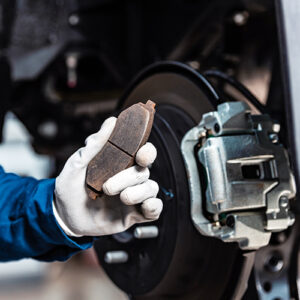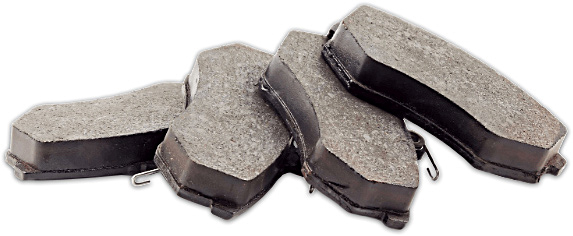When To Service Your Cars Brakes
How Do I Know When To Service My Cars Brakes?
Different driving patterns will have a major effect on how often your brakes need servicing.
Front brakes usually wear out faster than rear brakes because they handle a higher percentage of the braking load, especially on a front-wheel drive car.
If you are concerned about the performance of your brakes you should get them checked before going on a long journey
A brake job can mean just replacing brake pads or rotors to repairing or replacing the entire setup. Having a skilled mechanic work on your vehicle can give you peace of mind that it will be fixed properly.
Your brakes are probably the most important part of driving safely on the road. If your brakes are not working properly you are taking a risk that could lead to damage to your vehicle and bodily harm to you and passengers in your vehicle.

When To Get Brake Pads Checked?
It is recommended that brake maintenance be done at 20,000-60,000 miles or done every time you get your tires rotated. Depending on the road conditions and type of traffic your daily drive entails, you may need inspections more frequently. Your driving style will determine when, and how often you will need to get your brake pads replaced.
For example, a set of brake pads could last up to 60,000 miles or more on a car driven mostly on the freeway. However the brakes on the same car driven mostly in busy city traffic may last only 25,000 miles or less.
What Are Brake Pads Made Of?

Brake pads are made with one of three different types of material: organic, ceramic, and semi-metallic. Each material has its unique characteristics and pros and cons.
Signs Your Brakes Are Beginning To Fail
There are several tell-tale signs to look out for when applying your brakes
Squealing – there are many reasons why brakes squeal. It may be that a piston in the brake caliper is stuck and the brakes pad remains partially applied to the rotor. Some pads have wear indicators that scrape when worn to let the driver know the pads need changing. This may be a good reason to have the brakes inspected.
Pulling – Does your car pull to the left or right when you apply the brakes, especially at higher speeds? This is usually symptomatic of a sticking hydraulic component such as a seized caliper in front of the car on one side. An inspection can identify the reason for the vehicle pulling to one side.
Scraping – when the friction material on brake pads are heavily worn, this can result in a grinding noise as the brake pad has worn down its metal base plate. This will likely damage the brake rotor also.
Pulsating – If you feel a constant vibration from the brake pedal whenever you apply the brakes, this suggests the brake rotor has become warped due to excessive heat. This can also happen by the thinning of the rotor over time. these vibrations occur when the brake disc is distorted and no longer has a perfectly flat surface, when the brake pads make contact. You should have this checked out if you are concerned or it happens regularly.
Sponginess – If the brake pedal feels spongy and the brakes seem less responsive. This is a sign that air is in the brakes lines and is preventing the brake fluid from flowing through this system effectively. Having your mechanic bleed the brake will solve this problem.
Soft Brake Pedal – if the brake pedal goes all the way to the floor, this could mean a serious braking system problem which you should have inspected immediately. A brake pedal that is soft and can be pushed all the way to the floor usually means the brake fluid is either low or worst case ineffective and needs replacing, There can be several other potential reasons such as a faulty master cylinder or brake booster.
Brake Light On – if the brake warning light illuminates on your instrument panel either continuously or when you apply the brakes it may mean the brake fluid level is critically low. This could also indicate a leak in the brake hoses. In modern cars it can also mean that the ABS system has a fault in it. The ABS warning light will be illuminated simultaneously.
High Handbrake – If the handbrake is pulling up higher and does’nt feel tight as it normally does – it may need a cable adjustment.
Old Brake Fluid – When your brake fluid gets over 2 years old it may lose its effectiveness since it has hygroscopic properties which means it absorbs moisture over time. This affects the properties of the fluid which has a negative impact on your cars braking ability. Brake fluid should be change approximately every two years. If in doubt check your manufacturers handbook for more information.
The best way to be safe while driving is to have your vehicle inspected as quickly as possible when you notice any of the above symptoms.
Would you like to know more about how brakes work?
Do you need help getting your vehicle ready for sale? Then check out a few of our helpful car selling tips
Take the hassle out of selling your car. Make it easy – Give us a call today, Los Angeles Cash for Cars
